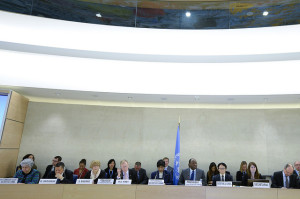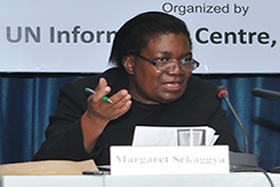
Credit: UN Photo/Jean-Marc Ferré
During its 25th regular session last month, the UN Human Rights Council undertook several measures to address the challenges and risks faced by human rights defenders and other civil society actors. On March 11, it held a panel discussion to analyze the factors that reduce civil society space and to evaluate strategies to promote an interactive partnership between States and civil society organizations (CSOs). Later in the session, the Council also adopted a resolution on the promotion and protection of human rights in the context of peaceful protests, and renewed the mandates of the Special Rapporteurs on the Situation of Human Rights Defenders and on Freedom of Expression.
Panel Discussion on Protecting Civil Society Space
This panel was the first formal Council discussion of civil society space as a human rights concern, according to the concept note, and was called for in a prior Human Rights Council Resolution A/HRC/RES/24/21 entitled “Civil society space: creating and maintaining, in law and in practice, a safe and enabling environment.”
Prior to the panel discussion, stakeholders stressed the need for such a dialogue, highlighting a rise in legislative restrictions on civil society, instances of governments forcibly shutting down civil society organizations without justification, and the imprisonment and harassment of civil society activists in order to suppress their legitimate work. See, e.g., UN Human Rights Council, Joint Written Statement Submitted by CIVICUS: World Alliance for Citizen Participation, a Non-governmental Organization in General Consultative Status, UN Doc. A/HRC/25/NGO/130, 18 February 2014, p. 2–3.
UN Secretary General Ban Ki-Moon opened the discussion, stating that the “space for civil society is a reflection of an entire society’s respect for human rights within its own borders, and indeed, around the globe.” UN Web TV, Recorded Panel Discussion on Protection of Civil Society Space, at 7:06.
The panelists were Safak Pavey, a member of the Committee on the Rights of Persons with Disabilities; Frank La Rue, the Special Rapporteur on the Promotion and Protection of the Right to Freedom of Opinion and Expression; Deeyah Khan, a film, music, and arts producer; and Mokhtar Trifi, the Honorary President of the Tunisian League for Human Rights.
The panelists and stakeholders drew attention to the diversity of civil society, acknowledging the crucial role CSOs play in protecting and promoting human rights. Stakeholders and State delegations advocated for strengthening national legislative frameworks so that they are consistently aligned with international human rights obligations to protect civil society space. See UN Web TV, Recorded Panel Discussion on Protection of Civil Society Space. Ms. Khan urged States to move past rhetoric and to genuinely agree to implement the freedom of expression, stating that it is the “cornerstone” of a “healthy, open, plural, [and] inclusive civil society” (at 2:32:40).
Some States urged CSOs to protect their own space and hold themselves to the same standards that they demand of governments, expressing concern over donor-driven agendas and funding that is susceptible to misuse. Mr. Trifi later insisted that public funding should be available without conditions attached, but with very strict rules prohibiting CSOs that violate the law from accessing funding. Mr. La Rue emphasized that applying human rights to CSOs is nothing new, and that CSOs do not need special restrictions to encourage transparency and accountability; the rule of law should apply equally to the law itself. See UN Web TV, Recorded Panel Discussion on Protection of Civil Society Space.
Mr. La Rue stated that the most important outcome of this discussion is for each State to establish mechanisms that protect human rights defenders. Mr. Trifi encouraged the implementation of an early warning model for violations of civil society space, and advocated for extending the Special Rapporteur on the Situation of Human Rights Defenders’ mandate to this end. Ms. Pavey discussed the importance of strengthening trust between States and CSOs, and between CSOs and all human rights mechanisms. She requested to give two minutes of her speaking time to an NGO who had not had an opportunity to speak. President Baudelaire Ndong Ella declined, explaining that he must respect rules that prevented him from giving the floor to an NGO at that time.
Hina Jilani, the moderator, expressed that she hoped the dialogue would lead to some form of engagement where CSOs can safeguard their independence while making governments more responsive to their voices, and that governments can overcome insecurities that lead to measures that restrict civil society space (at 2:42:00).
The Office of the High Commissioner for Human Rights will prepare a summary report of the panel discussion to be presented to the Human Rights Council at its 27th session.
Human Rights Defenders and Peaceful Protest
Later in the Human Rights Council’s session, Margaret Sekaggya, Special Rapporteur on the Situation of Human Rights Defenders, presented her final report, detailing continuing threats and attacks against human rights defenders. She stated:
I have seen the space for civil society and defenders visibly shrink in many parts of the world. Furthermore, I have observed the development of sophisticated forms of silencing the voices of defenders and impeding their work.

Credit: UN Photo
[OHCHR] She echoed and emphasized the need for a “safe and enabling environment for defenders.” Her recommendations to States included: refraining from criminalizing human rights defenders’ legitimate activities, investigating attacks by non-State actors against defenders, and publicly recognizing and supporting human rights defenders’ work. [OHCHR]
In renewing the mandate of the Special Rapporteur on the Situation of Human Rights Defenders, the Human Rights Council resolution further “strongly urges all States to take concrete steps to create, in law and in practice, a safe and enabling environment in which human rights defenders can operate free from hindrance and insecurity.” Human Rights Council, Draft Resolution A/HRC/25/L.24, 27 March 2014.
In its resolution on the promotion and protection of human rights in the context of peaceful protests, the Human Rights Council expressed its “concern about the number of attacks targeting human rights defenders and journalists” and at the increased criminalization of peaceful protest, and called on States to, inter alia:
promote a safe and enabling environment for individuals and groups to exercise their rights to freedom of peaceful assembly, of expression and of association, including by ensuring that their domestic legislation and procedures relating to the rights to freedom of peaceful assembly, of expression and of association are in conformity with their international human rights obligations and commitments, clearly and explicitly establish a presumption in favour of the exercise of these rights, and that they are effectively implemented;
Human Rights Council, Draft Resolution A/HRC/25/L.20, 24 March 2014.
The 25th Regular Session began on March 3 and concluded on March 28. During the session, the Human Rights Council engaged in dialogue with the Special Rapporteurs on Cultural Rights and on the Sale of Children, the Special Representatives of the Secretary General on Violence against Children, and on Children and Armed Conflict. The Council also held panel discussions on children’s rights, the human rights of persons with disabilities, human rights mainstreaming, the death penalty, combatting sexual violence in the Democratic Republic of the Congo, the 65th anniversary of the Convention on the Prevention and Punishment of the Crime of Genocide, and preventive approaches within the United Nations system. The full session agenda may be found here.
